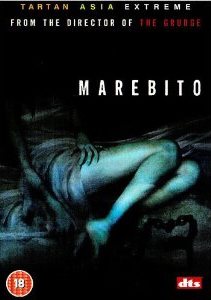
(AKA The Stranger From Afar)
"The answer was undergroundů"
It took me a while to pick up Takashi 'The Grudge' Shimizu's Marebito: having missed it at 2005's Frightfest (due to an apocalyptic absinthe hangover!) I had to content myself with the decidedly mixed reviews of people who were there - but this wide range of opinions led me to believe it would be worth checking out. And indeed it was: this is an authentically bleak, nightmarish film with a unique atmosphere.
Cameraman Masuoka (Shinya Tsukamoto) is a depressed loner with no steady income, no apparent family and no purpose in life: when he captures a bizarre suicide on camera - get ready for the ol' ocular trauma - he becomes obsessed with whatever drove this man to his death, studying the footage repeatedly to discover the 'something' which the man saw and which compelled the act. He decides that, whatever it was, he has to go back to the scene of the incident to find out, so he heads into the Tokyo Metro, where he finds a route even further undergroundů
There follows a genuinely creepy excursion into the bowels of the earth; as he goes, Masuoka references a solid array of concepts and sci-fi ideas, but it is the Lovecraftian 'Mountains of Madness' motif which is developed most conclusively here (the novel and the screenplay are both written by Chiaki J. Konaka, a Japanese Cthulhu Mythos author). In true Lovecraft style, as he encounters ghosts, strange, abnormal life forms and sinister human characters Masuoka seems to grow more and more unhinged, until eventually emerging into a bizarre subterranean landscape. He feels he has been 'invited' to this place by forces beyond his control, and, as he wanders through, he finds a young girl, seemingly alone, chained, and mute.
He takes the girl back to his apartment and there, his already obsessive interest in filming and surveillance intensifies. He sets up cameras throughout the apartment and constantly watches the girl (who he names 'F'). It soon becomes apparent that this strange being won't eat or drink normally, but - when Masuoka returns home cut and bleeding following an altercation with someone angry at being filmed - it seems she will drink blood.
Feeding 'F' therefore becomes Masuoka's top priority, even to the point of committing crimes. And for all that, as he tries in his warped way to protect the girl, it seems he's being watched himself.
Unlike the shock-scares present in The Grudge, Marebito does its work through a slow, dreamlike unravelling of the main protagonist's sanity; it isn't a fast-paced film and drifts, rather than drives towards a conclusion, but the way that it does so is very effective. It feels unusual, first of all, to have such an unhappy and dispossessed character at the heart of a Japanese film. Shinya Tsukamoto is plausible as the sinister, yet sympathetic Masuoka with his paranoid behaviour. The way that Masuoka's mental state frequently manifests itself - via relentless surveillance - also adds a layer of creepiness. The atmosphere is helped, not hindered, by abundant jerky, grainy camerawork which is often partially-obscured in darkness. Also, the heavy use of CCTV footage in the film means we are watching characters watching characters, which gives the film a weird refractory feel: we're doubly distant from a lot of the action, and this fuels the dreamlike air of the film, regardless of how violent or unpleasant the action is.
Lovecraftian motifs - people seeking arcane knowledge at the expense of their sanity, the existence of secret species beyond our understanding - are presented in an interesting way here, and the netherworld beneath Tokyo is a visual treat. As well as a Lovecraftian spin we also get an intriguing use of the vampire myth, but, be warned - the film doesn't fully develop these different elements, and prefers to leave the audience to ponder. This sort of semi-plot exposition certainly doesn't always work for me, but in this case, the film's genuine sense of unease and atmospherics kept me engaged throughout. Marebito is a traipsing, disturbing tale which meshes several horror themes together in an unsettling way, and is definitely one for fans of more avant-garde horror cinema. Mental breakdown is the common thread which runs through the film and so, as you might expect, disorientation and doubt go hand-in-hand with some stylish (and often pretty gruesome) action.
The Tartan Asia Extreme release is presented in Anamorphic 1.78:1. The picture is heavy on the cold, blue tones and has lots of deep blacks (though, as mentioned, the use of home video footage invariably leads to some variation in picture quality, though never to the detriment of the film). Sound is crisp and clear with great atmospheric incidental music, and you get to choose between DTS/Dolby 5.1 surround sound and the 2.0 stereo option.
There is a good array of special features on the disc; these are a 22-minute interview with Takashi Shimizu (where he discusses his late-coming to a love of horror), a 13-minute interview with star Shinya Tsukamoto, and a 16-minute interview with producer Hiroshi Takahashi. There's also the original theatrical trailer.
Review by Keri O'Shea
| Released by Palisades Tartan |
| Region 2 - PAL |
| Rated 18 |
| Extras : |
| see main review |